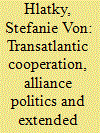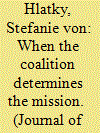|
|
|
Sort Order |
|
|
|
Items / Page
|
|
|
|
|
|
|
| Srl | Item |
| 1 |
ID:
137400


|
|
|
|
|
| Summary/Abstract |
A basic trade-off in military cooperation exists: States must respond to the dominant ally’s demands and act as a reliable partner while simultaneously making a decision that is acceptable to domestic audiences. We argue that compensatory burden-sharing strategies are imperfect but dependable solutions to manage foreign policy decisions at the domestic and alliance levels. Our theoretical expectations are tested using the US-Japan and US-Republic of Korea alliances and, in particular, the contribution of each country to the war in Afghanistan. We find that foreign aid commitments to third parties are made as a form of compensation when alliance expectations are substantial, but the secondary ally's ability to contribute militarily is highly constrained. Foreign aid has therefore served as an alliance management tool.
|
|
|
|
|
|
|
|
|
|
|
|
|
|
|
|
| 2 |
ID:
088740


|
|
|
| 3 |
ID:
127821


|
|
|
|
|
| Publication |
2014.
|
| Summary/Abstract |
This article discusses the North Atlantic Treaty Organization (NATO) debate regarding American nonstrategic nuclear weapons (NSNW) in Europe, given the broad spectrum of views on nuclear issues when comparing individual member states. What is striking is the gap between public attitudes - which are broadly hostile to keeping NSNW in Europe - and elite opinion, which privileges the maintenance of NATO commitments to preserve alliance cohesion. To better understand this tension, this article dissects the elements of extended nuclear deterrence in Europe, addressing the difficulties associated with current nuclear-sharing arrangements. For some NATO states, the alliance's nuclear weapons are a political liability, since nuclear sharing clashes with international disarmament and nonproliferation commitments. For other NATO members, maintaining the status quo is preferable, as long as there is no alliance-wide consensus on the question of NSNW. These debates have been put to rest, for now, with NATO's Deterrence and Defense Posture Review, which reaffirmed the purpose of the alliance's nuclear weapons. However, these divisive debates point to more fundamental issues in alliance management, namely the credibility of American commitments, the sustainability of extended nuclear deterrence in Europe and the inevitable political tensions these questions provoke at the domestic level for NATO allies.
|
|
|
|
|
|
|
|
|
|
|
|
|
|
|
|
| 4 |
ID:
186093


|
|
|
|
|
| Summary/Abstract |
In this article, we argue that the composition of coalitions is key to understanding military operations, because it encompasses decisive intra-coalition dynamics such as great power and alliance politics, caveats and institutional constraints. The case study analysis, focused on NATO’s war in Libya, relies on content analysis of national and NATO policy documents as well as interviews with policymakers and military officials. We find that, while great powers predictably shape how missions are designed and carried out, their precise influence is affected by factors that are inherent to a coalition’s composition.
|
|
|
|
|
|
|
|
|
|
|
|
|
|
|
|
|
|
|
|
|